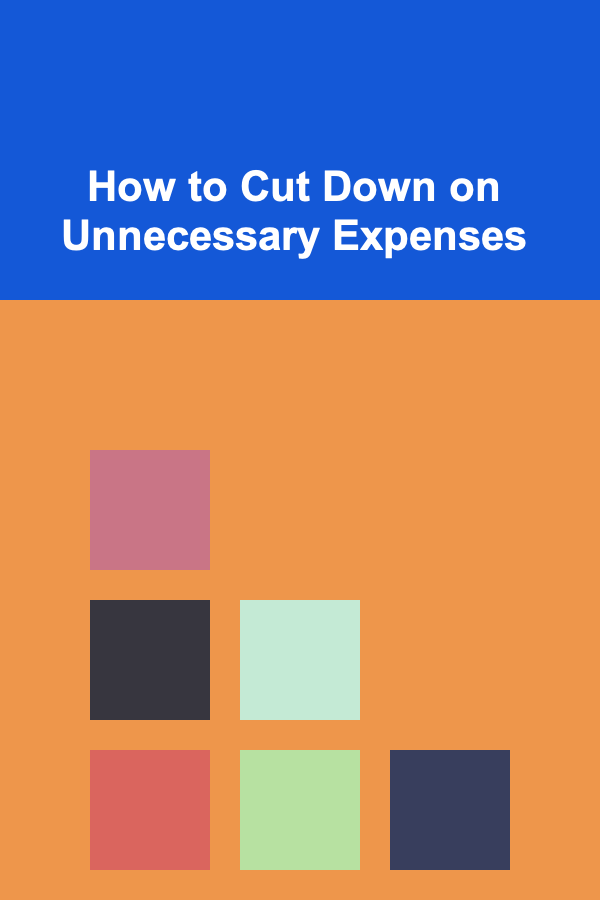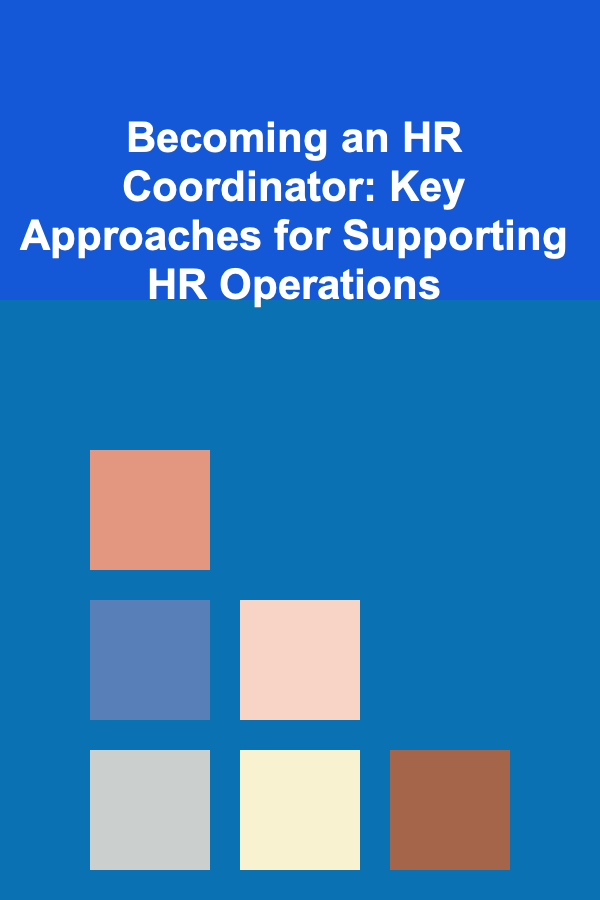
How to Cut Down on Unnecessary Expenses
ebook include PDF & Audio bundle (Micro Guide)
$12.99$6.99
Limited Time Offer! Order within the next:

Managing personal finances is a key aspect of financial well-being. One of the most effective ways to regain control over your finances is by identifying and cutting down on unnecessary expenses. By doing so, you not only free up more money for savings, but you also cultivate smarter spending habits that can lead to long-term financial stability. In this guide, we will explore practical and strategic ways to reduce unnecessary expenses, improve your budgeting, and make more informed decisions about your spending habits.
Understanding Unnecessary Expenses
Unnecessary expenses are expenditures that don't add significant value to your life, or that could be reduced or eliminated without affecting your quality of life. These expenses may vary from person to person, depending on lifestyle choices, financial goals, and individual circumstances. However, most people can benefit from cutting down on common categories of wasteful spending.
1.1 Types of Unnecessary Expenses
Some of the most common unnecessary expenses include:
- Subscription Services: Monthly charges for services such as streaming platforms, magazines, apps, or software subscriptions can quickly accumulate. Many people forget to cancel services they no longer use, or they subscribe to too many services at once.
- Impulse Purchases: These are unplanned purchases made on a whim, often driven by marketing tactics or emotional impulses. Impulse buying is especially common in retail environments and online shopping.
- Eating Out and Takeaways: Regularly dining out or ordering takeaways can be significantly more expensive than cooking at home. Many people overlook how much they spend on meals outside their home.
- Unused Memberships and Gym Fees: If you're paying for a gym membership you rarely use or belong to clubs and organizations that don't align with your goals or interests, you could be wasting money.
- Luxury Goods and Non-Essential Purchases: Expensive clothes, gadgets, or other luxury items that are not needed can strain your finances, especially if purchased too frequently.
- High-Interest Debts: Carrying high-interest credit card balances or payday loans can drain your finances due to accumulating interest charges. Avoiding unnecessary borrowing is crucial for cutting down on debt-related expenses.
- Unnecessary Insurance Coverage: Paying for insurance policies that you don't need or that cover more than necessary can result in extra costs. Review your insurance policies regularly to ensure they align with your needs.
1.2 The Impact of Unnecessary Expenses
Unnecessary expenses, if left unchecked, can have a significant impact on your financial health. Over time, small amounts of wasteful spending can add up to a large sum, reducing your ability to save, invest, and reach your financial goals. Cutting down on unnecessary expenses is one of the most direct ways to increase savings and improve your overall financial outlook.
Identifying Unnecessary Expenses
The first step in reducing unnecessary expenses is identifying where you're spending more than you need to. Here are some practical steps to help you analyze your expenses:
2.1 Track Your Spending
One of the most effective ways to identify unnecessary expenses is to track your spending. For at least a month, keep a record of every purchase, whether it's for groceries, entertainment, or online subscriptions. Use budgeting apps, spreadsheets, or even a simple notebook to track your expenditures. At the end of the month, review your spending to identify patterns and pinpoint areas where you may be overspending.
2.2 Categorize Your Expenses
Once you've tracked your spending, categorize your expenses into necessary and unnecessary items. Necessary expenses typically include housing, utilities, transportation, food, and healthcare. Unnecessary expenses might include luxury items, subscriptions you don't use, or habitual purchases like coffee from cafes every morning.
Categorizing your expenses will help you see where you have room to cut back. For example, if you're spending a significant amount on eating out, you might realize that preparing meals at home could help save money. Similarly, eliminating unused subscriptions could free up a substantial amount of your budget.
2.3 Review Your Past Statements
Reviewing your past credit card and bank statements can also help you spot unnecessary expenses. Check for subscriptions, charges, and purchases that you may have forgotten about or no longer need. Even small recurring charges can add up over time.
2.4 Ask Yourself if You Need It
A helpful mindset shift is to ask yourself, "Do I really need this?" before making any purchase. The difference between needs and wants can sometimes be blurry, but evaluating whether something is truly necessary before buying it can help curb impulsive spending habits.
Practical Strategies for Cutting Down on Unnecessary Expenses
Now that you understand how to identify unnecessary expenses, it's time to implement strategies to cut them down. Here are some effective methods for reducing wasteful spending:
3.1 Create a Budget
A well-defined budget is one of the most important tools for controlling your spending. By outlining your income and categorizing your expenses, you can ensure that you're spending within your means and prioritize essential purchases over non-essential ones. Here's how to create a simple budget:
- Track your income: Calculate how much money you earn per month.
- List your expenses: Write down all of your monthly expenses, including rent or mortgage, utilities, transportation, food, and entertainment.
- Set limits: Assign spending limits for each category. Be sure to allocate a portion of your income to savings.
- Monitor and adjust: Track your spending throughout the month to ensure you're staying on budget. Adjust the budget as necessary based on your actual spending patterns.
3.2 Cancel Unused Subscriptions
Review all your subscription services and cancel any that you no longer use or need. Streaming services, software, or memberships that you're not utilizing are prime candidates for cancellation. You can also take advantage of free trials, but make sure to cancel before they convert to paid subscriptions if you don't want to continue.
3.3 Cut Back on Eating Out
Dining out and ordering takeaways are often significant sources of unnecessary spending. Consider meal prepping, cooking in bulk, or preparing simple, healthy meals at home to save money. If you must eat out, try to limit the frequency and opt for more affordable options. You could also reduce the number of expensive coffee runs by brewing coffee at home or investing in a reusable coffee cup for when you do head out.
3.4 Eliminate Impulse Purchases
Impulsive spending often occurs when you're faced with enticing ads or when you're in an emotional state. To reduce impulse purchases, practice delaying gratification. If you're tempted to buy something, give yourself a 24-hour waiting period to determine if it's something you genuinely need. Another helpful tactic is to avoid shopping when you're stressed or bored.
3.5 Limit Luxury and Non-Essential Purchases
While treating yourself occasionally is important, spending too much on luxury goods or non-essential purchases can add up quickly. Evaluate your purchases and ask yourself whether they are really worth the cost. Consider investing in high-quality, durable items that will last longer instead of repeatedly buying cheap, short-lived alternatives.
3.6 Reduce High-Interest Debt
Carrying high-interest credit card debt or payday loans can drain your finances. Pay off high-interest debts as quickly as possible by focusing on the highest interest rate debts first. Consider transferring balances to a lower-interest card or consolidating your debt to reduce the amount you're paying in interest over time.
3.7 Review Your Insurance Policies
Insurance is a necessary expense, but you may be paying for more coverage than you need. Review your policies for auto, home, life, and health insurance to ensure that you're not over-insured or paying for add-ons that aren't beneficial. Shop around for better rates or adjust your coverage to fit your current needs.
3.8 Be Mindful of Your Utilities
Utilities such as electricity, gas, and water can sometimes be overlooked in terms of unnecessary expenses. Be mindful of energy usage by turning off lights when you leave a room, using energy-efficient appliances, and reducing water consumption. Even small changes in your habits can add up to significant savings over time.
3.9 Shop Smart
When it comes to grocery shopping, always make a list and stick to it. Avoid buying items you don't need just because they're on sale or because you're hungry. Look for discounts, use coupons, and buy in bulk when possible to save money in the long run. Consider shopping at discount stores or choosing generic brands over name brands for better savings.
The Importance of Mindful Spending
Cutting down on unnecessary expenses is not just about eliminating wasteful purchases. It's about adopting a more mindful approach to spending. Being conscious of how and where you spend your money can help you make better choices that align with your values and long-term goals.
Mindful spending encourages you to ask yourself questions like:
- "Is this purchase in line with my financial goals?"
- "Do I really need this item right now?"
- "Could I find a more affordable alternative?"
By practicing mindful spending, you can gain better control over your finances and develop habits that will serve you well in the future.
Long-Term Benefits of Cutting Down on Unnecessary Expenses
Reducing unnecessary expenses has long-term benefits that go beyond simply saving money in the short term. These benefits include:
- Increased savings: By cutting down on unnecessary spending, you'll have more money to save for emergencies, retirement, or future goals.
- Debt reduction: Reducing wasteful spending can free up funds to pay off high-interest debt, improving your overall financial situation.
- Better financial habits: When you focus on eliminating unnecessary expenses, you develop healthier financial habits that can set you up for success in the future.
- More financial freedom: As you reduce unnecessary expenses, you gain more control over your finances and can prioritize the things that matter most to you, such as travel, education, or personal growth.
Conclusion
Cutting down on unnecessary expenses is a practical and effective way to improve your financial health. By identifying where you're overspending and implementing strategies to reduce waste, you can free up more money for savings, investments, and achieving your financial goals. Whether you're focusing on reducing debt, eliminating impulse purchases, or being more mindful of your everyday expenses, each small step you take will help you move closer to financial stability and long-term success.

Becoming an HR Coordinator: Key Approaches for Supporting HR Operations
Read More
How to Get a High-End Look Using Budget Furniture
Read More
How to Use a Calendar to Plan Your Travel Dates Effectively
Read More
How to Use Wall Art as a Storage Solution
Read More
Start Here: The Guide to Time Blocking
Read More
How to Learn to Play by Ear on Any Instrument
Read MoreOther Products

Becoming an HR Coordinator: Key Approaches for Supporting HR Operations
Read More
How to Get a High-End Look Using Budget Furniture
Read More
How to Use a Calendar to Plan Your Travel Dates Effectively
Read More
How to Use Wall Art as a Storage Solution
Read More
Start Here: The Guide to Time Blocking
Read More